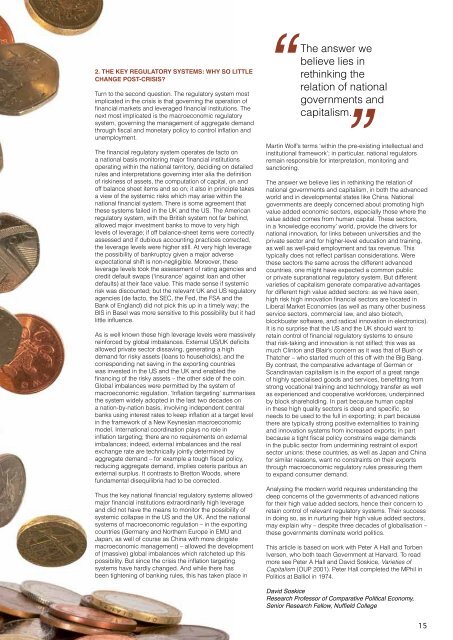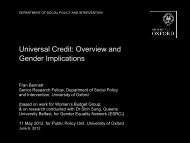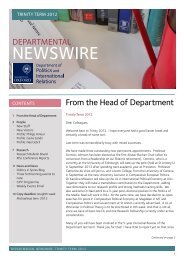Inspires - Department of Politics and International Relations ...
Inspires - Department of Politics and International Relations ...
Inspires - Department of Politics and International Relations ...
- No tags were found...
You also want an ePaper? Increase the reach of your titles
YUMPU automatically turns print PDFs into web optimized ePapers that Google loves.
2. The key regulatory systems: why so littlechange post-crisis?Turn to the second question. The regulatory system mostimplicated in the crisis is that governing the operation <strong>of</strong>financial markets <strong>and</strong> leveraged financial institutions. Thenext most implicated is the macroeconomic regulatorysystem, governing the management <strong>of</strong> aggregate dem<strong>and</strong>through fiscal <strong>and</strong> monetary policy to control inflation <strong>and</strong>unemployment.The financial regulatory system operates de facto ona national basis monitoring major financial institutionsoperating within the national territory, deciding on detailedrules <strong>and</strong> interpretations governing inter alia the definition<strong>of</strong> riskiness <strong>of</strong> assets, the computation <strong>of</strong> capital, on <strong>and</strong><strong>of</strong>f balance sheet items <strong>and</strong> so on; it also in principle takesa view <strong>of</strong> the systemic risks which may arise within thenational financial system. There is some agreement thatthese systems failed in the UK <strong>and</strong> the US. The Americanregulatory system, with the British system not far behind,allowed major investment banks to move to very highlevels <strong>of</strong> leverage; if <strong>of</strong>f balance-sheet items were correctlyassessed <strong>and</strong> if dubious accounting practices corrected,the leverage levels were higher still. At very high leveragethe possibility <strong>of</strong> bankruptcy given a major adverseexpectational shift is non-negligible. Moreover, theseleverage levels took the assessment <strong>of</strong> rating agencies <strong>and</strong>credit default swaps (‘insurance’ against loan <strong>and</strong> otherdefaults) at their face value. This made sense if systemicrisk was discounted; but the relevant UK <strong>and</strong> US regulatoryagencies (de facto, the SEC, the Fed, the FSA <strong>and</strong> theBank <strong>of</strong> Engl<strong>and</strong>) did not pick this up in a timely way; theBIS in Basel was more sensitive to this possibility but it hadlittle influence.As is well known these high leverage levels were massivelyreinforced by global imbalances. External US/UK deficitsallowed private sector dissaving, generating a highdem<strong>and</strong> for risky assets (loans to households); <strong>and</strong> thecorresponding net saving in the exporting countrieswas invested in the US <strong>and</strong> the UK <strong>and</strong> enabled thefinancing <strong>of</strong> the risky assets – the other side <strong>of</strong> the coin.Global imbalances were permitted by the system <strong>of</strong>macroeconomic regulation. ‘Inflation targeting’ summarisesthe system widely adopted in the last two decades ona nation-by-nation basis, involving independent centralbanks using interest rates to keep inflation at a target levelin the framework <strong>of</strong> a New Keynesian macroeconomicmodel. <strong>International</strong> coordination plays no role ininflation targeting; there are no requirements on externalimbalances; indeed, external imbalances <strong>and</strong> the realexchange rate are technically jointly determined byaggregate dem<strong>and</strong> – for example a tough fiscal policy,reducing aggregate dem<strong>and</strong>, implies ceteris paribus anexternal surplus. It contrasts to Bretton Woods, wherefundamental disequilibria had to be corrected.Thus the key national financial regulatory systems allowedmajor financial institutions extraordinarily high leverage<strong>and</strong> did not have the means to monitor the possibility <strong>of</strong>systemic collapse in the US <strong>and</strong> the UK. And the nationalsystems <strong>of</strong> macroeconomic regulation – in the exportingcountries (Germany <strong>and</strong> Northern Europe in EMU <strong>and</strong>Japan, as well <strong>of</strong> course as China with more dirigistemacroeconomic management) – allowed the development<strong>of</strong> (massive) global imbalances which ratcheted up thispossibility. But since the crisis the inflation targetingsystems have hardly changed. And while there hasbeen tightening <strong>of</strong> banking rules, this has taken place in“The answer webelieve lies inrethinking therelation <strong>of</strong> nationalgovernments <strong>and</strong>capitalism.”Martin Wolf’s terms ‘within the pre-existing intellectual <strong>and</strong>institutional framework’; in particular, national regulatorsremain responsible for interpretation, monitoring <strong>and</strong>sanctioning.The answer we believe lies in rethinking the relation <strong>of</strong>national governments <strong>and</strong> capitalism, in both the advancedworld <strong>and</strong> in developmental states like China. Nationalgovernments are deeply concerned about promoting highvalue added economic sectors, especially those where thevalue added comes from human capital. These sectors,in a ‘knowledge economy’ world, provide the drivers fornational innovation, for links between universities <strong>and</strong> theprivate sector <strong>and</strong> for higher-level education <strong>and</strong> training,as well as well-paid employment <strong>and</strong> tax revenue. Thistypically does not reflect partisan considerations. Werethese sectors the same across the different advancedcountries, one might have expected a common publicor private supranational regulatory system. But differentvarieties <strong>of</strong> capitalism generate comparative advantagesfor different high value added sectors: as we have seen,high risk high innovation financial sectors are located inLiberal Market Economies (as well as many other businessservice sectors, commercial law, <strong>and</strong> also biotech,blockbuster s<strong>of</strong>tware, <strong>and</strong> radical innovation in electronics).It is no surprise that the US <strong>and</strong> the UK should want toretain control <strong>of</strong> financial regulatory systems to ensurethat risk-taking <strong>and</strong> innovation is not stifled; this was asmuch Clinton <strong>and</strong> Blair’s concern as it was that <strong>of</strong> Bush orThatcher – who started much <strong>of</strong> this <strong>of</strong>f with the Big Bang.By contrast, the comparative advantage <strong>of</strong> German orSc<strong>and</strong>inavian capitalism is in the export <strong>of</strong> a great range<strong>of</strong> highly specialised goods <strong>and</strong> services, benefitting fromstrong vocational training <strong>and</strong> technology transfer as wellas experienced <strong>and</strong> cooperative workforces, underpinnedby block shareholding. In part because human capitalin these high quality sectors is deep <strong>and</strong> specific, soneeds to be used to the full in exporting; in part becausethere are typically strong positive externalities to training<strong>and</strong> innovation systems from increased exports; in partbecause a tight fiscal policy constrains wage dem<strong>and</strong>sin the public sector from undermining restraint <strong>of</strong> exportsector unions: these countries, as well as Japan <strong>and</strong> Chinafor similar reasons, want no constraints on their exportsthrough macroeconomic regulatory rules pressuring themto exp<strong>and</strong> consumer dem<strong>and</strong>.Analysing the modern world requires underst<strong>and</strong>ing thedeep concerns <strong>of</strong> the governments <strong>of</strong> advanced nationsfor their high value added sectors, hence their concern toretain control <strong>of</strong> relevant regulatory systems. Their successin doing so, as in nurturing their high value added sectors,may explain why – despite three decades <strong>of</strong> globalisation –these governments dominate world politics.This article is based on work with Peter A Hall <strong>and</strong> TorbenIversen, who both teach Government at Harvard. To readmore see Peter A Hall <strong>and</strong> David Soskice, Varieties <strong>of</strong>Capitalism (OUP 2001). Peter Hall completed the MPhil in<strong>Politics</strong> at Balliol in 1974.David SoskiceResearch Pr<strong>of</strong>essor <strong>of</strong> Comparative Political Economy,Senior Research Fellow, Nuffield College15









